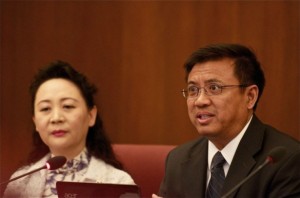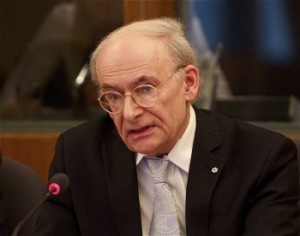Canadian MPs Tune in to Upheaval in China
Packed forum discusses crisis facing Chinese regime
By MATTHEW LITTLE
The Epoch Times (Canadian Edition)

PARLIAMENT HILL—Canadian Members of Parliament, Senators, and political staffers packed a lunch forum on Parliament Hill to hear about seismic shifts taking place in China, where senior cadres have been purged and leaked documents describe an agreement to dissolve the Chinese Communist Party.
“A hole has been pierced in the black veil that obscures the inner workings of the Chinese leadership,” said democracy activist Sheng Xue, “making political wrangling within the Party visible to the outside world for the first time in the regime’s 60-year rule.”
What has been revealed, noted each of Xue’s three co-panellists, is how a second centre of power created within the regime has become the focal point of contending forces.
PLAC Challenge
That second centre of power is the Political and Legislative Affairs Committee (PLAC), formerly headed by China’s security czar Zhou Yongkang. The PLAC presides over Chinese courts, police, domestic surveillance, and paramilitary police, with a budget that exceeds that of the Chinese military.
Xue, an awarding-winning journalist, was joined at the forum by human rights lawyer and Nobel Peace Prize Nominee David Matas, a member of the Order of Canada.
Matas noted how the PLAC rose in power with the persecution of Falun Gong, a traditional Chinese spiritual practice that became widely popular among China’s Han ethnic majority.

Practitioners of Falun Gong numbered up to 100 million according to estimates by the regime, and came from all levels within the Party. The practice was popular even among family members of the then seven members of the Standing Committee of the Politburo, the organ that rules China, that has since expanded to nine members.
When the PLAC was established in the early 1980s, it was no more powerful than other departments of the Chinese Communist Party’s (CCP) Central Committee, said panellist Yiyang Xia, senior director of policy & research with Washington D.C.-based Human Rights Law Foundation.
“By persecuting Falun Gong—a group comprising tens of millions of people from every province, age, and profession—the PLAC accumulated the power and experience for carrying out large-scale surveillance and suppression.”
Now that same mechanism is being used against all Chinese people with grievances against the regime, said Yiyang. With unrest in China at record highs, the PLAC has gained significant power.
U.S. Ambassador to China Gary Locke described China’s situation with popular unrest as “very very delicate” in an interview with National Public Radio in January, highlighting the problem facing the regime.
Power Struggle
Currently, the Chinese regime is split on how to deal with the problems it faces. Unrest leaves the regime two options: reform or crack down on dissent. Premier Wen Jiabao and current leader Hu Jintao support reforms, while the other side, led by Zhou Yongkang, wants the regime to maintain and strengthen its iron-fisted rule.
But the crux of the matter is actually how to deal with Falun Gong, noted Matas, who co-authored a report on forced organ harvesting from imprisoned Falun Gong practitioners.
Maintaining tight control is the only way Zhou’s side can guarantee they won’t be held accountable for their numerous crimes, particularly the crackdown on Falun Gong. Premier Wen, meanwhile, is using those crimes to purge Zhou and others.
“One side seeks impunity. The other uses violations to discredit their opponents,” said Matas.
However, a power struggle is always more than just that. There are competing values at stake. The side of Bo Xilai is afraid and jealous of a popular, moral, spiritual belief system. The side of Premier Wen Jiabao appreciates the link of Falun Gong to ancient Chinese traditions and values its morality.”
The upheaval in China began just as Prime Minister Stephen Harper left Canada to visit China on Feb. 6. That was the day that Wang Lijun, the top cop of Chongqing city, tried unsuccessfully to defect to the U.S. Consulate in Chengdu city.
Wang worked under Chongqing Party Secretary Bo Xilai, once China’s Minister of Commerce and well-liked among Canada’s business elite. Bo, once considered a rising star within the Chinese regime, was purged soon after his meeting with Harper.
Illicit Organ Transplants
Wang, who was Bo’s right-hand man through successive positions, came to national prominence in China for presiding over thousands of onsite organ transplants.
In 2006, Wang received the Guanghua Science and Technology Foundation Innovation Special Contribution Award for testing a slow lethal injection that allowed organs to be harvested before the victim died, thus maintaining the quality of the organs.
“In his acceptance speech, he talked about ‘thousands’ of on site organ transplant cases from injected prisoners in which he and his staff participated,” said Matas.
“He said, ‘to see someone being killed and to see this person’s organs being transplanted to several other person’s bodies is profoundly stirring,’ a remark that would have been worthy of Josef Mengele.”

Mengele was a German SS officer and a physician at Auschwitz.
Wang’s attempt to defect was the spark that led to the downfall of Bo Xilai, and later Zhou Yongkang, both of which were predicted by Epoch Times analysts, noted Jason Loftus, Deputy Publisher of The Epoch Times Canada edition, who also spoke at the forum.
Loftus described how senior cadres in China revealed to The Epoch Times that Zhou and Bo had conspired to oust Xi Jinping from power after he succeeded Hu during National Congress of the CCP scheduled for late this year or early next year.
Rewarded for Persecution
Zhou and Bo both rose to power under Jiang Zemin for their zealous adherence to his campaigning against Falun Gong. It was Jiang that gave the PLAC special authority and placed Zhou at its head.
Loftus noted how Jiang needed to ensure his allies remained in power so none of them would be held accountable for their crimes by political opponents.
“Jiang had to ensure the persecution would continue. Otherwise, Jiang would have reason to fear his legacy, his freedom, and even his life might be at risk. If the Party once stopped the persecution, then that huge part of the population that had been damaged would demand an accounting be made,” said Loftus.
Wang, Bo, and Zhou are all currently under investigation. Their downfall ends the prominence of Jiang’s faction and marks a fundamental shift within the regime.
With this shift comes an opportunity and responsibility for Canada, said Matas.
“While internal power struggles are normally matters only of internal concern, the persecution of Falun Gong and organ transplant abuse concern all humanity. They are crimes against humanity; crimes against us,” he said.
“We should take advantage of the opportunity this power struggle offers to support the side advocating an end to the persecution of Falun Gong, and an end to organ transplant abuse. In the current Chinese transition, Canada has an interest, for democracy, freedom, and human rights, which it must pursue.”
Editor’s Note: When Chongqing’s former top cop, Wang Lijun, fled for his life to the U.S. Consulate in Chengdu on Feb. 6, he set in motion a political storm that has not subsided. The battle behind the scenes turns on what stance officials take toward the persecution of Falun Gong. The faction with bloody hands—the officials former CCP head Jiang Zemin promoted in order to carry out the persecution—is seeking to avoid accountability for their crimes and to continue the campaign. Other officials are refusing any longer to participate in the persecution. Events present a clear choice to the officials and citizens of China, as well as people around the world: either support or oppose the persecution of Falun Gong. History will record the choice each person makes.
Related Articles
- Purge of China’s Security Chief in Sight, Says Insider
- How the Chinese Communist Party First Split on Falun Gong
